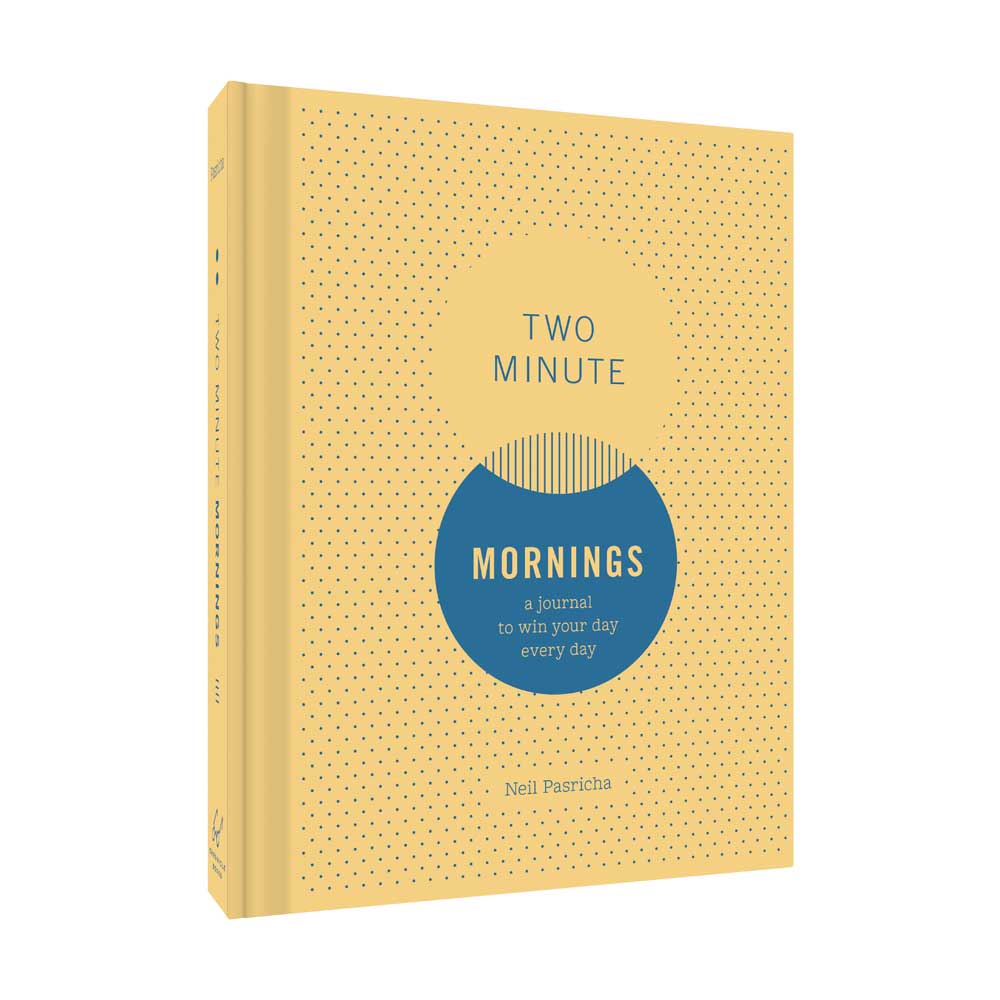
Two Minute Mornings
A journal prompting you into a quick, research-based, two-minute morning ritual that helps you win your day every day. We know the choices made every morning have a huge impact all day long. So this journal provides simple, quick prompts—focusing on gratitude, letting go of stress, and setting daily intentions—proven to increase happiness and set readers up for success every day. (Click retailer links below to see inside pages.)
About the Book
Life gets busy… fast.
Have you ever found yourself with so many browser tabs open you can’t see the titles anymore? Or discovered your pockets full with little scrap-paper notes you wrote to yourself throughout the day? Or felt anxious about your jammed schedule for tomorrow because you have no time to focus on what matters?
That was a freeze frame capture of me every day for the past few years.
I was writing books like The Happiness Equation and The Book of Awesome to teach people how to find mindfulness while running Leadership Development inside the world’s largest company.
Yet I couldn’t find it myself.
Well, it turns out the solution was right in front of me the whole time.
Based on positive psychology research, I began developing a simple little system for myself called “Two Minute Mornings.”
After I woke up I spent the first two minutes of my day filling in my answers to three simple sentences:
- I will let go of…
- I am grateful for…
- I want to focus on…
The difference in my life was both immediate and incredible.
The two minutes helped me suddenly “win the morning” which helped start momentum towards me “winning the day.”
Letting go of a stress helped me crystallize a worry to avoid mentally revisiting it over and over throughout the day. The gratitude list helped me prime my brain for positivity. And focusing my attention on a few small commitments – a project to finish, a tough conversation I’d been waiting to have, and a twenty-minute run, for example – actually sealed the deal.
If you’re not already sold, scientific research supports the positive effect of all of these actions, too. (See “Why It Works” below.)
So what is Two Minute Mornings?
It’s the simple journal to help you rig the game so you can win it. It’s a quick therapeutic intervention from our future focused society to both feel better and get more done. No wonder research shows a positive mindset results in 31% higher productivity, 37% higher sales, and 3x more creativity.
All from taking a few moments to let go of something, feel grateful, and bring some focus to your day.
Two Minute Mornings is by far the best two minutes of my day, every day.
And I hope it becomes yours too.
Neil
—
WHY IT WORKS
1. I will let go of…
Research titled “Don’t look back in anger!” by Brassen, Gamer, Peters, Gluth, and Bluch (2012) reported in Science magazine shows that minimizing our regrets as we age creates greater contentment and happiness. The research also shows that holding regrets causes us to take more aggressive and risky behaviors in the future. The most healthy and happy people notice mistakes in their lives and then choose to let them go. This written exercise crystallizes that effect and allows them to pass through your mind instead of sizzling your emotions all day.
2. I am grateful for…
Research by Emmons and McCullough (2003) shows if you write down five gratitudes a week you’re measurably happier over a ten week period. Research shows the more specific the better. We know if people write down “family, food, job” or something similarly vague over and over it really doesn’t cause any happiness increase. Our minds don’t relive any specific experience. Try things like: “When Trooper learned to shake a paw”, “The moment I saw Ana bringing me a coffee”, or “How Antonio finally put the toilet seat down,” etc.
3. I will focus on…
The goal of the daily focus is to strip away the endless list of things you could do into a bite-sized list of things you will do. Why? Because if you don’t you will mentally revisit your could-do list all day. And that will cause decision fatigue. See, decision making energy uses a particularly complex part of the brain and we’re wasting energy anytime we’re unfocused. As Florida State Professor of Psychology Roy Baumeister and New York Times journalist John Tierney say in Willpower: Rediscovering The Greatest Human Strength “Decision fatigue helps explain why ordinarily sensible people get angry at colleagues and families, splurge on clothes, buy junk food at the supermarket and can’t resist the dealer’s offer to rust-proof their new car. No matter how rational and high-minded you try to be, you can’t make decision after decision without paying a biological price. It’s different from ordinary physical fatigue— you’re not consciously aware of being tired—but you’re low on mental energy.”
I use the daily focus to write down three small goals I want to achieve (and importantly can achieve) that day. It feels great crossing them off and satisfying to close the day on a high. If I missed one, I can just add it to tomorrow. An example? “Write Chapter 7 for new book, call Erin about PR campaign, and play tennis with Alec.”






